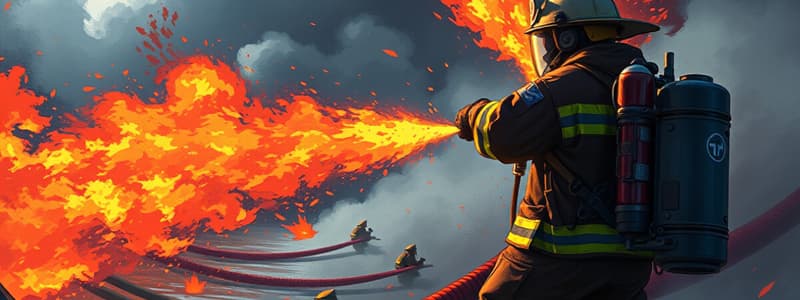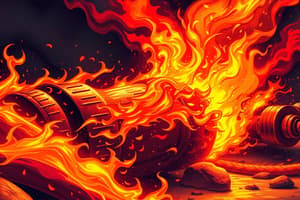Podcast
Questions and Answers
What is the flow rate (GPM) for a 1-3/4" master stream tip size?
What is the flow rate (GPM) for a 1-3/4" master stream tip size?
- 500
- 400
- 800 (correct)
- 600
Which handline hose has the highest friction loss at 200 GPM?
Which handline hose has the highest friction loss at 200 GPM?
- FL 3" Hose
- FL 2 1/2" ECO-10 Hose
- FL 1-3/4" Hose (correct)
- FL 1 1/2" Key Combat Hose
What is the stack tip pressure for a master stream?
What is the stack tip pressure for a master stream?
- 100 PSI
- 80 PSI (correct)
- 50 PSI
- 70 PSI
What is the maximum flow for a Blitz Fire with a 1-1/4" tip size?
What is the maximum flow for a Blitz Fire with a 1-1/4" tip size?
At a flow rate of 125 GPM, what is the pressure loss for a FL 1 1/2" Key Combat Hose?
At a flow rate of 125 GPM, what is the pressure loss for a FL 1 1/2" Key Combat Hose?
What is the flow rate of the 2-1/2" Metro 2 fog nozzle?
What is the flow rate of the 2-1/2" Metro 2 fog nozzle?
What is the friction loss for appliance flows over 350 GPM?
What is the friction loss for appliance flows over 350 GPM?
How much elevation loss is incurred per 10 feet after the first floor?
How much elevation loss is incurred per 10 feet after the first floor?
What is the total engine pressure (EP) if the friction loss (FL) is 10 PSI, nozzle pressure (NP) is 75 PSI, appliance loss (AL) is 10 PSI, and elevation loss (EL) is 5 PSI?
What is the total engine pressure (EP) if the friction loss (FL) is 10 PSI, nozzle pressure (NP) is 75 PSI, appliance loss (AL) is 10 PSI, and elevation loss (EL) is 5 PSI?
What is the appliance loss for a flow rate that is less than 350 GPM?
What is the appliance loss for a flow rate that is less than 350 GPM?
Flashcards are hidden until you start studying
Study Notes
Master Streams
- Master stream tip sizes range from 1-3/8" to 2", with corresponding flow rates from 500 GPM to 1000 GPM.
- For master streams, a stack tip pressure of 80 PSI is required.
Blitz Fire
- Available tip sizes for Blitz Fire range from 1" to 1-1/2", with flows from 250 GPM to 600 GPM.
- Maximum flow for Blitz Fire is capped at 500 GPM.
Handline 3" Hose
- Handline 3" hose configurations feature tip sizes of 1" to 1-1/4", delivering flows between 200 GPM and 325 GPM.
- A stack tip pressure of 50 PSI is necessary for handlines.
Friction Loss (FL) Tables
- Friction loss is calculated per 100 feet of hose used, affecting water pressure based on GPM:
- For 1-3/4" hose:
- 95 GPM = 15 PSI
- 200 GPM = 60 PSI
- For 1-1/2" Key Combat hose:
- 200 GPM = 30 PSI
- For 2-1/2" ECO-10 hose:
- 500 GPM = 50 PSI
- For 3" hose:
- 500 GPM = 20 PSI
- For 5" hose:
- 1500 GPM = 20 PSI
- For 1-3/4" hose:
Engine 288 Fog Nozzles
- Fog nozzle options include:
- 1-3/4" Akron: 200 GPM at 100 PSI
- 1-3/4" Metro 1: 150 GPM at 75 PSI
- 2-1/2" Metro 2: 250 GPM at 50 PSI
- Ladder 34's elevated master stream uses Elkhart Brass Scorpion nozzle: 1250 GPM at 75 PSI.
Appliance Loss
- Friction loss is zero for flows less than 350 GPM; it increases to 10 PSI for flows greater than 350 GPM.
- A friction loss of 25 PSI applies to all master streams flowing 350 GPM or more.
Elevation Loss
- Loss due to elevation is calculated at 5 PSI for every 10 feet above the first floor.
- Relay pumping incurs 20 PSI plus friction loss.
- Standpipes/sprinklers require 150 PSI plus 5 PSI for each additional floor.
Key Abbreviations and Formula
- Key terms:
- Nozzle Pressure (NP)
- Friction Loss (FL)
- Appliance Loss (AL)
- Elevation Loss (EL)
- Engine Pressure (EP)
- Formula to calculate engine pressure:
- EP = FL + NP + AL + EL
Studying That Suits You
Use AI to generate personalized quizzes and flashcards to suit your learning preferences.




